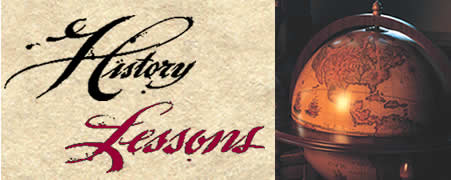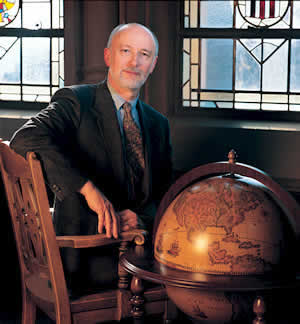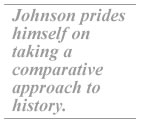
"They are often intrigued at finding someone with an English accent teaching American history," he says, laughing. "Although they're never intrigued to find someone with an American accent teaching English history. There's a certain curious irony there."
Ironies and curiosities aside, the series should be Johnson at his best.
His colleagues rave about the longtime professor's ability to paint a vibrant portrait of American history through the stories of the people of a particular time. And Johnson prides himself on taking a comparative approach to history. By comparing personalities from colonial America, at least one area historian thinks Johnson may have landed on the perfect recipe for an entertaining series.

History Professor Richard Johnson, a native of England, has a world of ideas about why the American Revolution is still being felt in the U.S. today. Photo by Kathy Sauber. Globe courtesy 1-World Globes, Seattle.
"He's one of the crown jewels of the history department," Bridgman says. "He is a superb lecturer and it's certainly an interesting topic. I think it couldn't help but be an extremely interesting lecture series."
Johnson, who once chaired the department, also gets accolades from its current chair, John Findlay.
"I've always regarded Richard Johnson as a quality teacher," he says. "He's thoughtful and entertaining. He always has an interesting angle on the subject and he's tremendously funny. He conveys a lot about history by talking about individuals in a way that makes history come alive."
That focus on individuals doesn't come at the expense of his comparative approach, according to Johnson. Maybe because he grew up in another country and spent so much time studying medieval history before shifting to American history, Johnson can't help but compare and contrast.
He prefers to put the American Revolution into a global context, to look at how it affected different segments of society in this country and around the world.
"One aspect of American historians that I find a little troubling sometimes is that they tend to focus so much on the United States that they see it as totally exceptional. They don't perceive parallels and distinctions and so on in a way that they might. This wouldn't happen if you were studying English history in the context of European history."

For example, one comparison he says shouldn't be overlooked is Europe's colonial history and the United States' so called settling of the West.
"One of the parallels that can and sometimes has been drawn is that some countries expanded overseas and others could expand within their own continent," he says. "Czarist Russia could expand east and the U.S. could expand west. That led to different approaches to the native people who were subjugated, or absorbed, or invited to join the system.
"That tends to suggest a slightly less exceptionalist history for the United States. That doesn't mean the United States has not been, shall we say, extraordinarily favored by providence and something of a model for other countries in how it has developed its political systems."
This time Johnson points to Australia and Canada for comparison. Both were former colonies, both are now independent nations. Neither, however, has a revolutionary past and the resulting sense of separate origin, like the United States. Because of its revolutionary beginnings, Johnson says, the United States has a tendency to justify present policies by looking back to a glorified and heroic past.
Go To: Page 1 | Page 2 | Page 3- Return to December 2002 Table of Contents